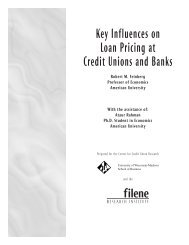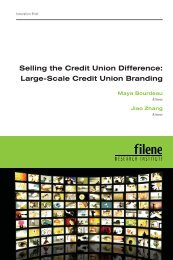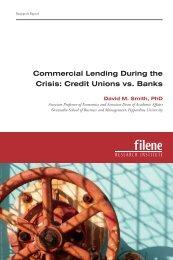Credit Union and Cooperative Patronage Refunds - Filene ...
Credit Union and Cooperative Patronage Refunds - Filene ...
Credit Union and Cooperative Patronage Refunds - Filene ...
You also want an ePaper? Increase the reach of your titles
YUMPU automatically turns print PDFs into web optimized ePapers that Google loves.
<strong>Patronage</strong> earnings that are allocated <strong>and</strong> distributed to patrons must<br />
be “paid” within eight <strong>and</strong> one-half months of the cooperative’s fiscal<br />
year end, the outside limit of the statutory time allotted to file the<br />
cooperative tax return. At least 20% of this distribution must be paid<br />
with cash or by qualified check.<br />
The balance (up to 80%) of the allocation is distributed <strong>and</strong> “paid”<br />
to patrons with qualified written notices of allocation (QNAs). 17<br />
The written notice advises the<br />
patron that a finite amount of<br />
In Subchapter T cooperatives, a tax deduction is allowed to the patronage earnings (up to 80%<br />
cooperative for patronage earnings that it allocates to patrons of allocated patronage earnings)<br />
on the basis of their proportional patronage of the cooperative. was allocated on the cooperative’s<br />
books to the patron on<br />
the basis of the patron’s proportional<br />
patronage of the cooperative. Patrons are required to consent<br />
18 (most often contained in the bylaws, but consent can also be<br />
obtained by endorsement of a qualified check or separate agreement)<br />
to report these earnings on their tax returns.<br />
Sub-T co-ops report payments to patrons who receive a distribution<br />
of patronage earnings in cash <strong>and</strong> QNAs of $10 or more on form<br />
1099-PATR. Consumers do not pay income tax if the transactions<br />
from which the patronage income arose were for personal, living,<br />
or family expenditures that were not tax deductible. In fact, some<br />
consumer cooperatives may apply for <strong>and</strong> receive an exemption from<br />
filing 1099-PATRs. 19 If, however, the member’s transaction with the<br />
cooperative produces taxable income or a tax deduction, the income<br />
reported on a 1099-PATR must be reported on the member or<br />
patron’s tax return as well.<br />
Sub-T cooperatives are not required to redeem allocated equities.<br />
Case law from across the United States upholds the authority of a<br />
board of directors to determine for itself, at its sole discretion, when<br />
to redeem allocated equities. Some of these cases, however, also<br />
intimate that the board cannot just retain surplus working capital<br />
without redeeming allocated equity. This is consistent with the view<br />
that cooperatives do not exist to hoard capital.<br />
Sub-T cooperatives are required to maintain patronage records so<br />
that in the event of dissolution of the cooperative, the remaining<br />
proceeds can be distributed on the basis of historical patronage.<br />
28








